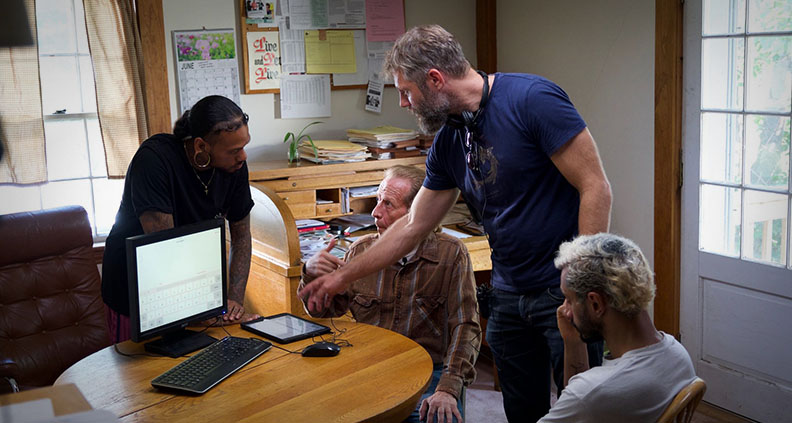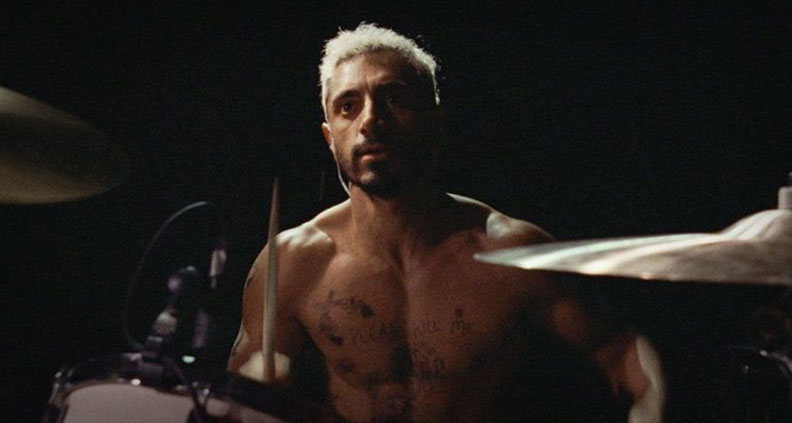Darius Marder on Acting, Authenticity and the Aural Experience of ‘Sound of Metal’
NOTE: the below interview originally ran in February of this year. See Darius Marder accept Sound of Metal‘s Spirit Award for Best First Feature here. Catch up with the rest of the 2021 Film Independent Spirit Awards on YouTube.
***
When it came time to finally make his long-in-the-works feature debut, Sound of Metal, filmmaker Darius Marder invariably did things the hard way. Like the challenging production trifecta of shooting on location, chronologically and on film, capped off by an intensive post process. Also, the film’s lead would need to A) be proficient in the American Sign Language that Sound of Metal protagonist Ruben eventually learns to speak in within the film, but also B) credibly play complicated drum patterns in front of a live audience. A tall order for any first-time director—though Marder’s attention to detail seems to have paid off.
Premiering at last year’s Sundance, Sound of Metal is a portrait of Riz Ahmed’s Ruben—a recovering heroin addict and hardscrabble noise rock musician—who must cope with the loss off identity that comes when he begins to lose his hearing after many years of raucous live shows alongside his bandmate and partner Lou, played by Olivia Cooke. The film had received universal praise—including ongoing awards recognition.
We spoke to Marder (a LA Film Festival alum with his 2008 documentary Loot) about Sound of Metal approach to authenticity, character-building and sound, and to learn why the writer/director values such experiential filmmaking.
DARIUS MARDER

To start, I wanted to ask about some of the very specific decisions you made in the production of Sound of Metal, like those to shoot chronologically and on film. What prompted those?
Marder: Every single iota of this process was about process and performance. These sorts of performances you see onscreen don’t just happen, there’s a reason Riz and Paul are being nominated. I was an actor myself and I’m deeply enmeshed in the mechanics and art of [acting], so it was all about creating a real experience. And that has everything to do with shooting on film, how we shot the movie, how we did sound—it’s a hyper-organic process. It’s part of the reason I didn’t make the movie earlier. I could have made a movie that might have satisfied the business people that would have meant not casting someone from deaf culture in the role of Joe; that would have meant not shooting chronologically; that would have meant not going to Europe. And it certainly wouldn’t have involved playing live music in a club, with a real audience. I had all those fights. I went through a lot of producers and financiers, and at the end of the day the people involved are people who supported that vision.
I want to talk about developing the character of Ruben with Riz. How much collaboration is something like that? What percentage of the final product was on the page and what percentage did Riz bring?
Marder: That’s an interesting way to frame it. Riz brought all of it, but he’s exactly what I wrote. Both are true. Riz is fascinating—he’s not the Ruben I was thinking of, necessarily. Before I met him, I didn’t know his work that well, if at all. I had watched [HBO’s] The Night of… and he’s so talented. But still, I wasn’t thinking, “this is Ruben.” It’s my belief that, in order to find a transcendent performance, there has to be something at stake. There’s no single good performance that’s ever been done that was faked; it’s always an actor drawing from something that’s real in them. And really outstanding actors, they have this vast rich garden of delights they can draw from. So when I first met Riz… He’s a bit of a savant, someone who really analyzes and devours everything. And that fired me up. I recognized very quickly that there was an opportunity here for Riz to go on a process that was about relinquishing that [control], that was about physicality and the process over time of physically embodying a character.
What were some of the challenges of the performance?
Marder: Well, it involved learning the drums and learning ASL. It’s physical and it’s real—it starts to live in your body. Each one of these processes requires you to lose control. The first time Riz sat at the drums he wanted to control the drums…
He wanted to be a drum machine.
Marder: That’s the way Riz operates. But what’s beautiful about the drums is there’s no way to cheat the process. You can’t think your way through it; you can’t control it. You have to work overtime so the right-left brain hemispheres start to connect and work together. The same is true for ASL, it’s a relinquishing of control. So Riz learned that, he actually felt it in his body.

I know you’ve been talking about the deaf community a lot around the release of this film, but one thing equally as authentic in its depiction in the film is the underground music scene.
Marder: They’re equally as important, because they’re both identities. I think for my brother [Sound of Metal Co-Screenwriter Abraham Marder] and I, it was terrifying to think about portraying music onscreen. I think something Derek [Cianfrance] said to me years ago, he said: “Your problem is that actors can’t play music, and you can’t cast musicians because they won’t be good enough.” Because there’s nothing more puke inducing than seeing some false expression of a subculture. But I realized I didn’t want to cast someone who knew how to do this. I wanted people who had never done it before because the act of striving for it was going to be the building blocks of those characters and their relationships.
Can you talk about capturing those musical performances?
Marder: An unbelievable amount of work went into just being able to do that concert. This was a live show with a live audience, there was such a potential for absolute failure. There was no cheating going on, Olivia was playing guitar and screaming and looping pedals in real time. But that allows it to be incredibly liberating, because Olivia and Riz had to fight through that together.
Speaking of making noise, the sound design of Sound of Metal is obviously a huge part of what makes it special. I’m curious—are there, like, folders and subfolders full of different mixes of stuff you tried that didn’t make it into the film for whatever reason?
Marder: Oh my god, yeah. You have to remember: the sound design goes back to well before we started shooting. It was a very deep process going back 12 years. I met Nicolas [Becker, Sound of Metal Supervising Sound Editor and Composer] and we started experimenting more, going into soundless chambers, mic’ing inside of skull helmets and trying to create this radically organic sound that would feel true and real. We literally recorded Riz, the interior of his body…
Wow, can you talk about that? I didn’t realize it was that intense.
Marder: Yeah, Nicolas would be on set with this assortment of mics, his multi-directional mics and his underwater mics and stethoscope mics. So we’re literally recording, biologically, the inside of Riz after he would shoot something, when his heart was racing and he was in this emotional state. We’d record his eyelids, the dryness of his mouth, his lips. And we used all of that. The mix and the sound work after the shoot was six times longer than the shoot. I was there for every single minute of it—it was intense.
I wish there was an episode of that show Song Exploder just about your film.
Marder: I wish we documented more of it. It was just extraordinary. We did it at Carlos Reygadas’s sound compound in Mexico. And again, for every piece of this movie everything was set up to be an experience unto itself—that’s the whole methodology in the way I like to work.
Sound of Metal is now streaming on Amazon Prime. To watch our recent Film Independent Presents Q&A with Darius, click here. Check out our complete list of 2021 Film Independent Spirit Nominees here.
Film Independent promotes unique independent voices by helping filmmakers create and advance new work. To become a Member of Film Independent, just click here. To support us with a donation, click here.
More Film Independent…
(Header: Darius Marder working with Riz Ahmed on set)